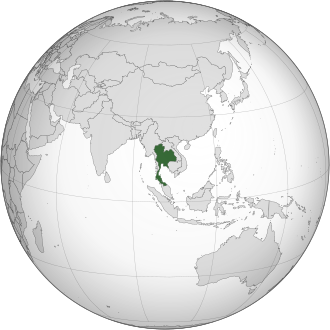Thailand
File:Thai National Anthem - US Navy Band.ogg File:Thai Royal Anthem - US Navy Band.ogg

Thailand, officially known as the Kingdom of Thailand and formerly known as Siam, is a country at the center of the Southeast Asian Indochinese Peninsula. It is bordered by Myanmar and Laos to the north, Laos and Cambodia to the east, the Gulf of Thailand and Malaysia to the south, and the Andaman Sea and the southern extremity of Myanmar to the west. With a population of over 66 million people, Thailand is the world's 50th-largest country by land area and the 22nd-most-populous. The capital and largest city is Bangkok, a significant political, commercial, industrial, and cultural hub.
History[edit]
Thailand's history is characterized by its strategic geographical location, between large empires of India and China, and its people's successful assimilation of influences from both these cultures. Thai people originally migrated from southwestern China to mainland Southeast Asia over millennia. The country's history is divided into several periods, starting from the Sukhothai Kingdom in the 13th century, followed by the Ayutthaya Kingdom, Thonburi Kingdom, and finally, the current Rattanakosin Kingdom which was established in 1782. Throughout its history, Thailand is the only Southeast Asian nation never to have been colonized by a European power.
Geography[edit]
Thailand features a variety of landscapes, including the mountainous forested areas of the north, the vast rice fields of the central plains, the semi-arid farm lands of the northeast, and the tropical islands and long coastline of the southern peninsula. The country's major river, the Chao Phraya River, flows through the central plains, into the Gulf of Thailand. This geographical diversity has significantly influenced Thailand's social and cultural identity.
Economy[edit]
Thailand is a newly industrialized country. Its economy is heavily export-dependent, with exports accounting for more than two-thirds of its gross domestic product (GDP). Thailand's major exports include cars, computers, electrical appliances, rice, textiles and footwear, fishery products, rubber, and jewellery. Tourism also contributes significantly to the Thai economy. The country is among the world's leading tourist destinations, thanks to its rich cultural heritage, tropical beaches, and vibrant nightlife.
Culture[edit]
The culture of Thailand is influenced by Buddhism, which is practiced by around 95% of the population. This influence is evident in the country's art, literature, and performances. Thai cuisine, known for its fervent use of fresh herbs and spices, is also an integral part of its culture. Thailand's festivals, such as Songkran and Loy Krathong, are colorful and vibrant, reflecting the country's unique cultural traditions and religious practices.
Government and Politics[edit]
Thailand is a constitutional monarchy, with the King as head of state and the Prime Minister as head of government. The political system has undergone numerous changes over the years, including several military coups and shifts between military and civilian rule. The country's current constitution was promulgated in 2017, following a military coup in 2014.
Education and Health[edit]
Education in Thailand is provided mainly by the Thai government through the Ministry of Education from pre-school to senior high school. A free basic education of fifteen years is guaranteed by the constitution. Thailand's healthcare system includes government and private hospitals, with universal healthcare coverage for all Thai nationals under the Universal Coverage Scheme.
Demographics[edit]
The population of Thailand comprises various ethnic groups, including Thai, Chinese, Malays, and indigenous hill tribes. The official language is Thai, and the primary religion is Buddhism, practiced by the majority of the population.
Ad. Transform your life with W8MD's Budget GLP-1 injections from $75


W8MD offers a medical weight loss program to lose weight in Philadelphia. Our physician-supervised medical weight loss provides:
- Weight loss injections in NYC (generic and brand names):
- Zepbound / Mounjaro, Wegovy / Ozempic, Saxenda
- Most insurances accepted or discounted self-pay rates. We will obtain insurance prior authorizations if needed.
- Generic GLP1 weight loss injections from $75 for the starting dose.
- Also offer prescription weight loss medications including Phentermine, Qsymia, Diethylpropion, Contrave etc.
NYC weight loss doctor appointmentsNYC weight loss doctor appointments
Start your NYC weight loss journey today at our NYC medical weight loss and Philadelphia medical weight loss clinics.
- Call 718-946-5500 to lose weight in NYC or for medical weight loss in Philadelphia 215-676-2334.
- Tags:NYC medical weight loss, Philadelphia lose weight Zepbound NYC, Budget GLP1 weight loss injections, Wegovy Philadelphia, Wegovy NYC, Philadelphia medical weight loss, Brookly weight loss and Wegovy NYC
|
WikiMD's Wellness Encyclopedia |
| Let Food Be Thy Medicine Medicine Thy Food - Hippocrates |
Medical Disclaimer: WikiMD is not a substitute for professional medical advice. The information on WikiMD is provided as an information resource only, may be incorrect, outdated or misleading, and is not to be used or relied on for any diagnostic or treatment purposes. Please consult your health care provider before making any healthcare decisions or for guidance about a specific medical condition. WikiMD expressly disclaims responsibility, and shall have no liability, for any damages, loss, injury, or liability whatsoever suffered as a result of your reliance on the information contained in this site. By visiting this site you agree to the foregoing terms and conditions, which may from time to time be changed or supplemented by WikiMD. If you do not agree to the foregoing terms and conditions, you should not enter or use this site. See full disclaimer.
Credits:Most images are courtesy of Wikimedia commons, and templates, categories Wikipedia, licensed under CC BY SA or similar.
Translate this page: - East Asian
中文,
日本,
한국어,
South Asian
हिन्दी,
தமிழ்,
తెలుగు,
Urdu,
ಕನ್ನಡ,
Southeast Asian
Indonesian,
Vietnamese,
Thai,
မြန်မာဘာသာ,
বাংলা
European
español,
Deutsch,
français,
Greek,
português do Brasil,
polski,
română,
русский,
Nederlands,
norsk,
svenska,
suomi,
Italian
Middle Eastern & African
عربى,
Turkish,
Persian,
Hebrew,
Afrikaans,
isiZulu,
Kiswahili,
Other
Bulgarian,
Hungarian,
Czech,
Swedish,
മലയാളം,
मराठी,
ਪੰਜਾਬੀ,
ગુજરાતી,
Portuguese,
Ukrainian
